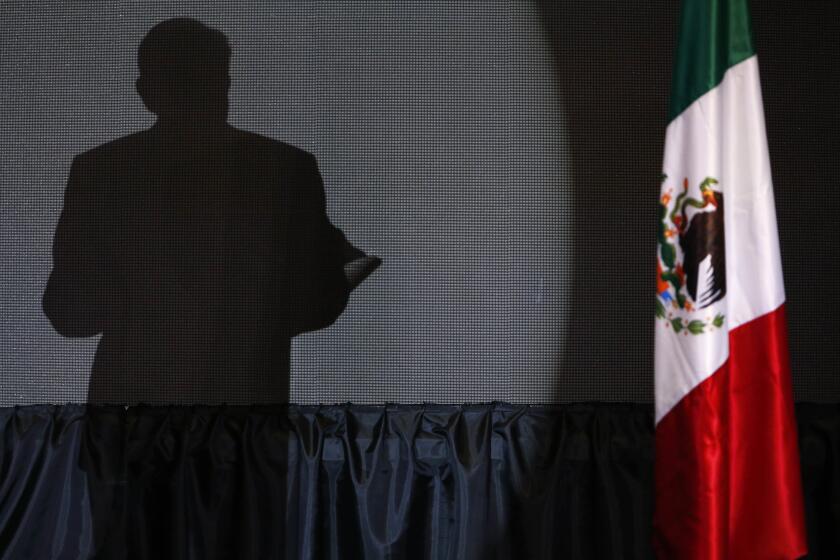Russia Warns of Preemptive Strikes
Russia’s top military commander threatened Wednesday to launch preemptive strikes on terrorist bases “in any region of the world,” raising questions about how far Moscow will go to hunt down suspected Chechen separatists believed responsible for killing more than 400 people in three terrorist attacks in the last two weeks.
Russia also announced a $10-million reward for the “neutralization” of Chechnya’s top two rebel leaders, Aslan Maskhadov and Shamil Basayev. Maskhadov has vigorously denied involvement in and condemned last week’s hostage-taking at a school.
Both of the Russian statements marked a stepped-up attempt by the Kremlin to counter U.S. calls for political settlement with Chechen separatists and to assuage the grief of a public still reeling from the deaths of 335 hostages at the school in southern Russia.
“Military steps are an extreme measure in the fight against terrorism,” Col. Gen. Yuri Baluyevsky, the Russian armed forces chief, said after meeting with North Atlantic Treaty Organization commanders. “Our position on preemptive strikes has been stated before, but I will repeat it: We will take steps to liquidate terror bases in any region.”
He added that Russia did not plan to use nuclear weapons in such strikes.
The statement caused unease in neighboring Georgia. Over the years, Russia has accused Georgia of allowing Chechen rebels to take shelter in the remote gorges along its northern border.
A spokesman for Maskhadov in London predicted that Russia would step up attempts to kill Chechens abroad.
“Mr. Baluyevsky seems to have made it perfectly clear to everybody today that Russia will now begin to hunt down and destroy separatists and terrorists wherever they are,” Akhmed Zakayev said.
In what seemed to be one such incident, former senior Chechen official Zelimkhan Yandarbiyev died in a car bombing in February in Qatar. Two Russian agents were convicted in the killing, though Moscow has denied involvement.
Russia’s announcements may have been aimed in part at countering continued U.S. statements supporting a political settlement with Chechen separatists. On Tuesday, State Department spokesman Richard Boucher said Washington’s “view on the overall situation has not changed” in the wake of the hostage crisis. Ultimately, “there must be a political settlement” over Chechnya, he said.
Such remarks have clearly irritated Russian President Vladimir V. Putin, who has rejected the idea.
“Why don’t you meet Osama bin Laden, invite him to Brussels or to the White House and engage in talks, ask him what he wants and give it to him so he leaves you in peace?” he asked foreign journalists Monday.
Pressed to clarify the U.S. stance Wednesday, Boucher said the U.S. did not encourage talks with “terrorists.” But he did not say which Chechens the U.S. would support talks with.
“A group of people who are clearly terrorists took over a school and murdered men, women and especially children. That’s not a political act,” he said.
Russia was critical of the U.S. when Washington in 2002 announced its policy of preemptive strikes against perceived threats. Moscow also strongly opposed the U.S. war in Iraq. But the Kremlin has since updated its military protocol to allow for preventive strikes, and Wednesday’s announcement did not represent a policy shift.
Timothy Colton, a Russian studies professor at Harvard University, said Moscow’s warning came from a sense of frustration with four years of terrorist attacks and the unsettled situation in Chechnya, where separatists have fought Russian forces off and on for a decade.
“Everything they’ve tried has not worked. They have this massive military capacity to do things kind of on the old playing field, and they’re trying to let people know they feel free to use those assets wherever they want,” he said.
“The whole point of mentioning that there won’t be nuclear weapons is to remind everybody that they have nuclear weapons,” he added, though the chances of Russia using them in such a case are “close to mathematical zero.”
Alexander Golts, military analyst with the magazine Yezhenedelny Zhurnal, said it was unlikely that Russia could carry out effective strikes against Chechen rebel bases.
“Russia has up until now had great difficulties in determining the location of terrorist bases in Chechnya, to say nothing about bases abroad,” he said. “Baluyevsky’s statement appears to be merely an attempt to pretend to be doing something ... for what has happened [at the school] is not just a terrible tragedy, it is an appalling disgrace for Russia, which shows the utter impotence and helplessness of the Russian power-wielding ministries.”
Still, Wednesday’s announcement in Moscow was met with anxiety in Georgia. With U.S. help, Georgia has trained its anti-terrorism forces and largely dislodged Chechen rebels from the Pankisi Gorge, most military analysts believe.
But Russian officials in recent weeks have hinted at new concerns.
Georgian Defense Minister Giorgi Baramidze said in a telephone interview that his country had “concerns” over the Russian general’s pledge.
“Could Mr. Baluyevsky have Georgia in mind when he was making this statement? Even the possibility that he could have meant Georgia while making this statement makes us want clarifications,” Baramidze said.
“We have offered Russia cooperation in the sphere of combating terrorism and separatism in the region. However, it needs to be admitted that this cooperation has not progressed that far yet and has not been that successful,” he added.
*
Alexei V. Kuznetsov of The Times’ Moscow Bureau contributed to this report.
More to Read
Sign up for Essential California
The most important California stories and recommendations in your inbox every morning.
You may occasionally receive promotional content from the Los Angeles Times.










